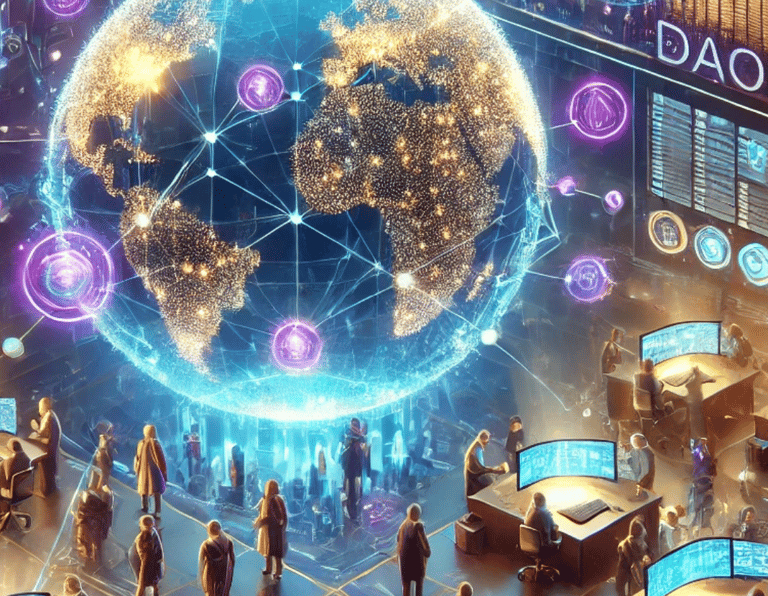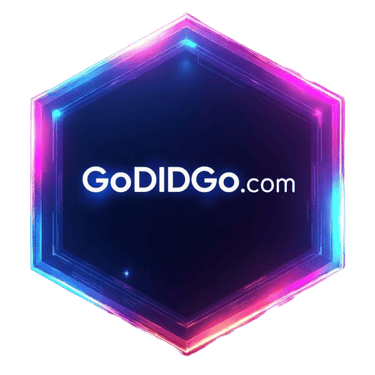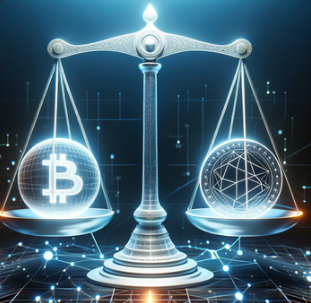The Future of Work in Web3: DAOs, Global Freelancers, and New Digital Economy Models
godidgo.com
12/4/20245 min read


Understanding Web3 and Its Impact on Work
Web3 is an emerging paradigm that signifies the transition from centralized internet platforms to decentralized networks, fundamentally altering how people interact, conduct business, and work. At its core, Web3 is built on blockchain technology, which provides a secure and transparent platform for transactions and data exchanges. This shift not only enhances user control over data but also promotes user ownership through decentralized applications (dApps) that operate on peer-to-peer networks.
The implications of Web3 for the workforce are profound, representing a notable departure from traditional employment models. Centralized systems often impose restrictions on user engagement and ownership, but Web3 offers a framework where individuals can claim more significant agency over their contributions and earnings. This decentralization leads to increased transparency, as all transactions are recorded on a public ledger, allowing workers to verify processes independently. Such transparency cultivates trust among participants, potentially reducing the need for intermediaries and promoting collaboration across borders.
Furthermore, Web3 facilitates greater security through advanced cryptographic measures, enhancing the protection of personal and professional information. In a landscape where data breaches are pervasive, this security assurance is vital for fostering a reliable work environment. Additionally, the rise of decentralized autonomous organizations (DAOs) exemplifies how Web3 can redefine organizational structures. DAOs enable collective decision-making without centralized authority, allowing freelancers and workers to engage in governance directly and equitably.
As various industries begin to embrace these transformative aspects of Web3, workers can expect both opportunities and challenges. While the potential for increased flexibility and autonomy is significant, navigating the complexities of decentralized systems will require adaptation. Understanding these foundational technologies is crucial for workers to thrive in the evolving landscape of the digital economy.
Decentralized Autonomous Organizations (DAOs): Redefining Collaboration
Decentralized Autonomous Organizations (DAOs) represent a transformative shift in how collaborative work is structured, embodying the principles of the Web3 ecosystem. These organizations harness blockchain technology to facilitate transparent and democratic decision-making. Unlike traditional institutions, DAOs operate without centralized leadership, enabling all members to participate in governance through a consensus-driven model. This structure not only distributes authority but also promotes engagement among global freelancers, empowering them to contribute to projects on an equal footing.
At the core of a DAO's functionality is the use of smart contracts, which automatically execute actions when predefined conditions are met. This technology ensures that all transactions and governance decisions are recorded on the blockchain, enhancing transparency and accountability. Members of a DAO can propose changes, vote on initiatives, and allocate resources collectively, thus fostering a collaborative environment devoid of hierarchical constraints. This innovative governance model significantly reduces overhead costs and inefficiencies typically associated with traditional organizational frameworks.
The shared ownership structure of DAOs presents significant advantages for freelancers and workers. Individuals can stake their tokens to participate in the decision-making process, earning rewards proportional to their contributions and investments in the organization. This system not only incentivizes participation but also instills a sense of responsibility and commitment among members. However, the decentralized nature of DAOs also poses certain challenges. Issues such as voter apathy, coordination difficulties, and the potential for forks in governance can complicate decision-making processes.
Several successful DAOs currently exemplify these concepts across diverse sectors. For instance, MakerDAO operates within the decentralized finance (DeFi) space, managing the DAI stablecoin. Gitcoin, focusing on funding open-source projects, facilitates collaboration among developers and funders, leading to more sustainable outcomes. As the Web3 ecosystem continues to evolve, understanding the intricacies of DAOs will be crucial for freelancers and organizations aiming to thrive in this new digital economy.
The Rise of Global Freelancers in a Digital Economy
The advent of Web3 technologies has significantly transformed the landscape of work, ushering in a new era where global freelancers can thrive in a dynamic digital economy. These innovations empower individuals to connect seamlessly across geographical boundaries, fostering collaboration, creativity, and diversity in the workforce. The decentralized nature of Web3 encourages the formation of global networks, enabling freelancers to offer their services to a broader audience. As a result, businesses benefit from accessing a rich talent pool, enhancing their capacity to meet diverse project demands.
One of the compelling advantages for freelancers is the flexibility that this new environment provides. Freelancers can choose projects that align with their interests and skill sets, allowing them to work at their own pace and schedule. This autonomy not only promotes job satisfaction but also enhances productivity, as individuals are more motivated when engaged in work they are passionate about. Furthermore, businesses can leverage this flexibility to scale their operations according to project needs without the commitments associated with traditional employment contracts.
However, the rise of global freelancing is not without its challenges. Increased competition in a decentralized marketplace can make it difficult for individuals to stand out, making it essential for freelancers to cultivate a strong personal brand and network. Additionally, income stability emerges as a significant concern, with freelancers often facing inconsistent earnings. The navigation of new payment systems, particularly cryptocurrencies and blockchain-based solutions, can present hurdles for those unfamiliar with these technologies.
Emerging platforms are playing a crucial role in facilitating this evolving freelancer ecosystem. They provide tools for project management, payment processing, and networking, contributing to a more organized and user-friendly freelance environment. As the digital economy continues to expand, the opportunities and challenges for freelancers will undoubtedly evolve, shaping the future of work in this innovative landscape.
Future Models of the Digital Economy: Opportunities and Challenges
The emergence of Web3 heralds a transformative phase in the digital economy, characterized by novel models such as token economies, decentralized finance (DeFi), and innovative monetization strategies. This shift presents numerous opportunities for both workers and businesses, creating a landscape that supports dynamic compensation structures and equitable ownership models. Token economies enable individuals to earn tokens for their contributions, providing direct incentives tied to project success. These tokens can then be traded or used within various ecosystems, enhancing the flow of capital and value.
Decentralized finance further democratizes access to financial services, allowing users to borrow, lend, and trade without traditional intermediaries. By leveraging smart contracts on blockchain platforms, DeFi protocols offer users greater autonomy over their finances and facilitate peer-to-peer transactions. This model can significantly reduce fees and open up new income streams for those willing to engage with these digital assets. Furthermore, the evolution of monetization strategies, including subscription models, pay-per-use, and micropayments, is reshaping how businesses approach revenue generation in this new digital ecosystem.
Despite these promising prospects, there are notable challenges that must be navigated. Regulatory concerns loom large, as governments and institutions grapple with how to effectively oversee this rapidly evolving landscape. The lack of clear regulatory frameworks can create uncertainty for individuals and businesses alike, potentially stifling innovation. Moreover, the digital divide poses a significant barrier; access to technology and the internet remains unequal, preventing many from participating fully in these emerging opportunities.
Also critical is the need for upskilling in response to the demands of the new economy. As roles evolve, workers must adapt and acquire new skills to remain competitive. Continuous learning and adaptability will be essential for both individuals and organizations aiming to thrive in a world shaped by decentralized structures and digital transformations.

Get in touch
Feel free to contact us to inquire about any of the Web2/DNS and Web3/Onchain domains showcased on our platform. We are open to receiving proposals and evaluating direct purchase offers for all the digital assets featured.
Our team is also available to explore tailored agreements and negotiated sales, ensuring a smooth and efficient acquisition process that aligns with your specific needs.
Connect with us to amplify your identity across both the Web2/DNS & Web3/Onchain landscape. Together, let's redefine the future of digital identities and brands.
Contact us now to elevate your DIDs & Brands to new heights, because in the world of Go DID Go! your Digital Identity is not just owned; it's celebrated!
Contact Us
info@godidgo.com




